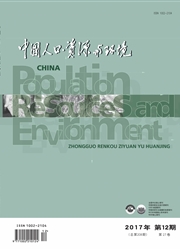

 中文摘要:
中文摘要:
梳理能源开发、人力资本作用于全要素能源效率的机制,以1998—2011年省际面板数据为样本,使用Undesirable-SBM模型测算了包含非期望产出的全要素能源效率,运用面板Tobit模型检验了能源开发、人力资本对全要素能源效率的影响方向与影响程度。结果显示:(1)能源开发相对强度与绝对强度对于全要素能源效率的影响并不相同,并且在全国层面和区域层面存在着不容忽视的差异。(2)人力资本未能带来全要素能源效率的显著改善。(3)结构变量与开放经济变量对于全要素能源效率的影响各不相同,节能减排政策对于全要素能源效率的促进效应已经显现。能源与碳排放约束下,应延伸资源经济链条、坚持以运用为导向的人力资本开发策略。
 英文摘要:
英文摘要:
This paper reviews the mechanism of energy exploitation, human capital on total factor energy efficiency, using Undesirable-SBM model to estimate total factor energy efficiency containing undesirable output, using the provincial panel data of mainland China over the period of 1998—2011, employing the panel Tobit model to test the effect of energy exploitation, human capital on total factor energy efficiency. The results show that:(1)The relative strength and absolute strength of energy exploitation have a different impact on total factor energy efficiency, and at the national level and regional level there are differences that cannot be ignored.(2)Human Capital fails to bring significant improvement in total factor energy efficiency.(3)The effect of structural variables and open economic variables on total factor energy efficiency varies, while energy saving and emission reduction policy for the promotion of total factor energy efficiency has worked. Under the constraint of energy saving and carbon emission reduction, we should extend the chain of resource economics and adhere to the use-oriented strategy of human capital development.
 同期刊论文项目
同期刊论文项目
 同项目期刊论文
同项目期刊论文
 期刊信息
期刊信息
